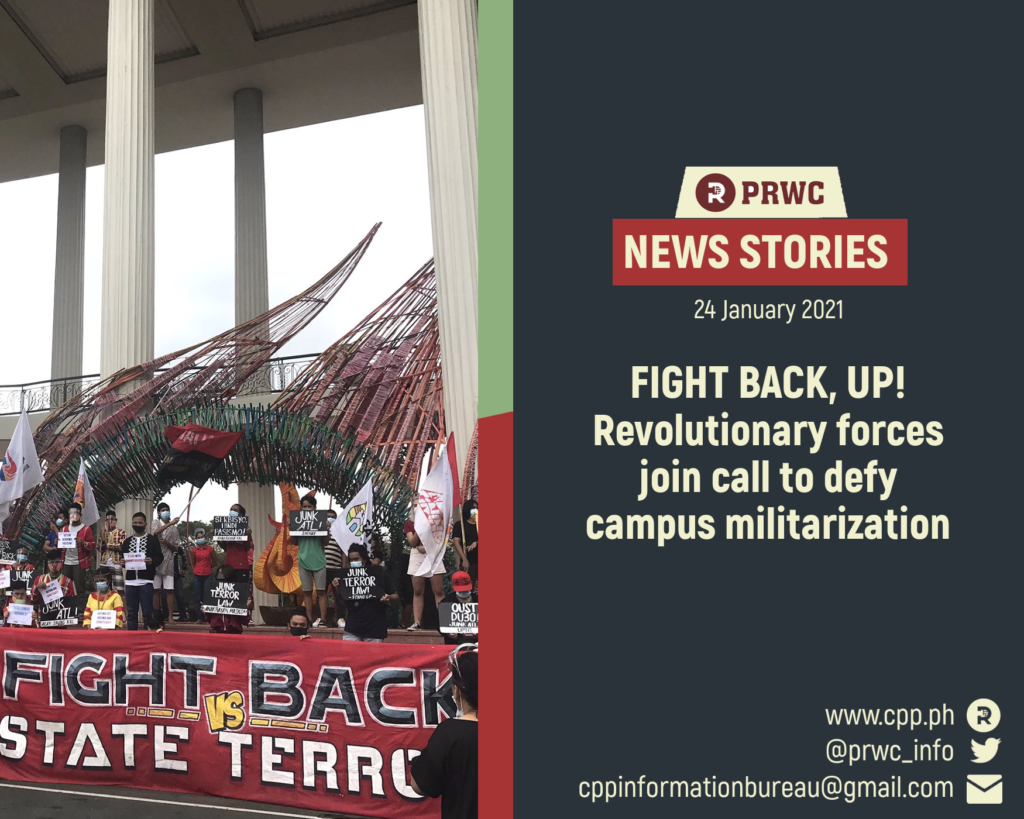FIGHT BACK, UP! Revolutionary forces join call to defy campus militarization

Various revolutionary organizations joined the University of the Philippines (UP) community in condemning the unilateral abrogation of the 1989 UP-DND accord last January 18 by Department of National Defense Sec. Delfin Lorenzana.
The abrogation came right before the commemoration of the Diliman Commune’s golden anniversary this February. The commune was an uprising of university students, faculty members and the transport sector to defend and barricade the University from military and police interference.
The Communist Party of the Philippines (CPP), in a statement, said that the termination’s objective is to sow fear and terror, and place the university under the tyrannical rule of Duterte’s military and police.
To justify the unilateral abrogation, the Armed Force of the Philippines (AFP) once again propped up the “communist bogeyman,” saying the CPP is using the campus as recruitment grounds and for its activities. AFP spokesperson Antonio Parlade even claimed that students are being taught “bomb making” inside the campus. When met with widespread ridicule, spokesman Maj. Gen. Edgar Arevalo then suggested that there could be a drug laboratory and illegal drug operations inside the campus. The police also went as far as declaring Barangay UP Campus a “crime hotspot.” These absurd claims were belied by the university’s own police force who said that only between 1 to 2% of overall safety and security-related incidents are drug-related. The UP Police only tallied 91 security cases in campus last year, most of which are property-related.
UP System officials and campus chancellors have denounced this affront to the University. Barangay UP Campus has also expressed its condemnation. They particularly resented the AFP’s use of their urban gardens for a media blitz where soldiers brazenly entered their barangay with military trucks and claimed co-ownership.
“The Duterte regime is hell-bent on targeting youth and student leaders in its campaign of terror and red-tagging,” said the Kabataang Makabayan (KM).
The KM chapters in Bicol and South East Negros, and the National Democratic Front-Southern Tagalog expressed their support to the UP community.
“(The regime) cannot deny and is deeply distressed by the growing force of the youth,” added KM National Spokesperson Maria Laya Guerrero.
Vice President Leni Robredo expressed her opposition to the abrogation of the accord, correctly saying it is meant to “sow fear” and “silence criticism.” In the Senate, eight senators backed a resolution objecting to the unilateral termination of the accord. Members of the House of Representatives similarly sounded the alarm on the issue. Bills to legislate the terms of the accord have been filed in both houses.
Several institutions including the Commission on Higher Education (CHED) and individuals offered their offices to “mediate” between UP and the DND. The UP Vanguard Inc., alumni organization of the UP Reserve Officers’ Training Corps (ROTC), expressed willingness “to help make this genuine and transparent dialogue happen.”
Pushed back by the reaction of the public and various institutions, the AFP and Sec. Lorenzana have flip-flopped on the issue. Lorenzana was forced to agree to a dialogue with UP officials but “only if UP can explain the deaths of some of its students in armed encounters” with the AFP. The UP syteme
On January 22, a Facebook page called the AFP Information Exchange Center published a list of supposed UP alumni who joined the NPA, were caught and are now dead. The list included names of very-much alive lawyers and government officials such as Alex Padilla and Rafael Aquino. Most of the named alumni reacted vehemently to the listing and demanded an apology from the AFP, prompting Lorenzana to issue one on January 24. The AFP Facebook page has long taken down the offending post. UP Pres. Dan Concepcion was not appeased. He asked, how many more students are on those supposed list? Are they all in danger of being red-tagged and subjected to state surveillance and repression?
The CPP challenged the current crop of UP students, as the university’s main stakeholder, to take the cudgels of defending the university by going beyond online solidarity and converging in campus in their numbers to manifest their determination to defend their freedoms.
